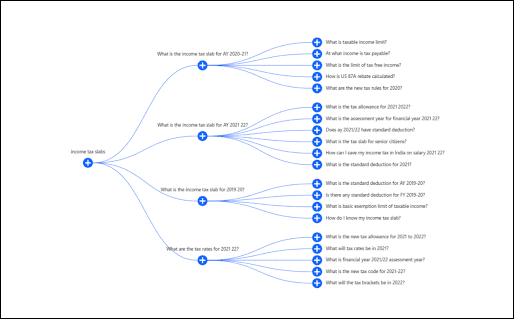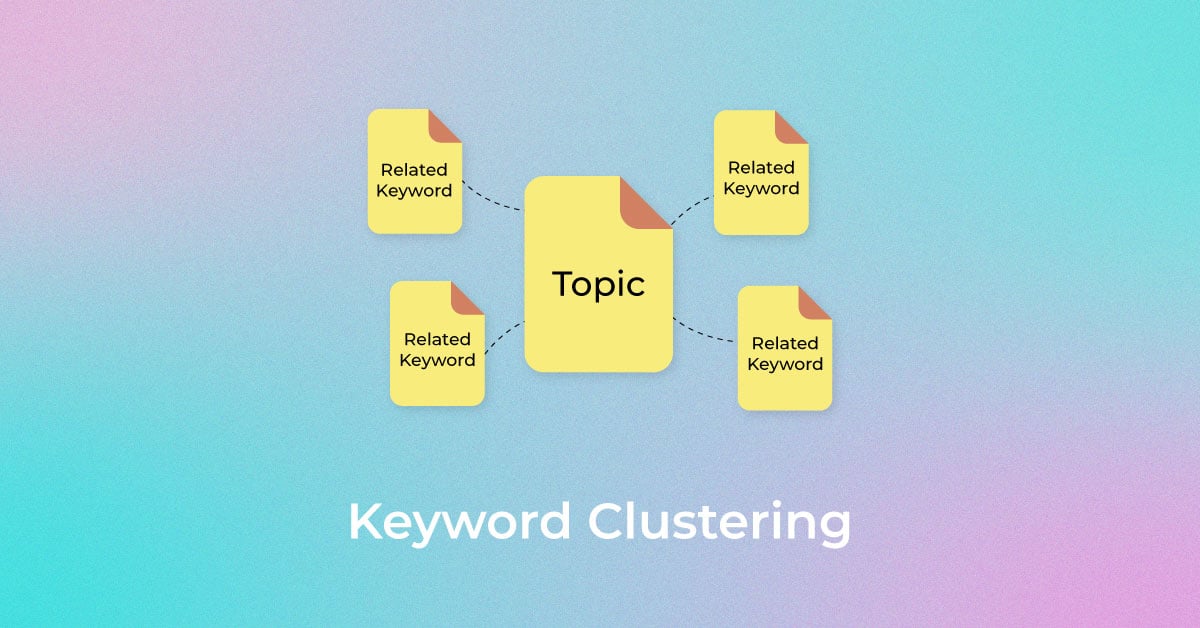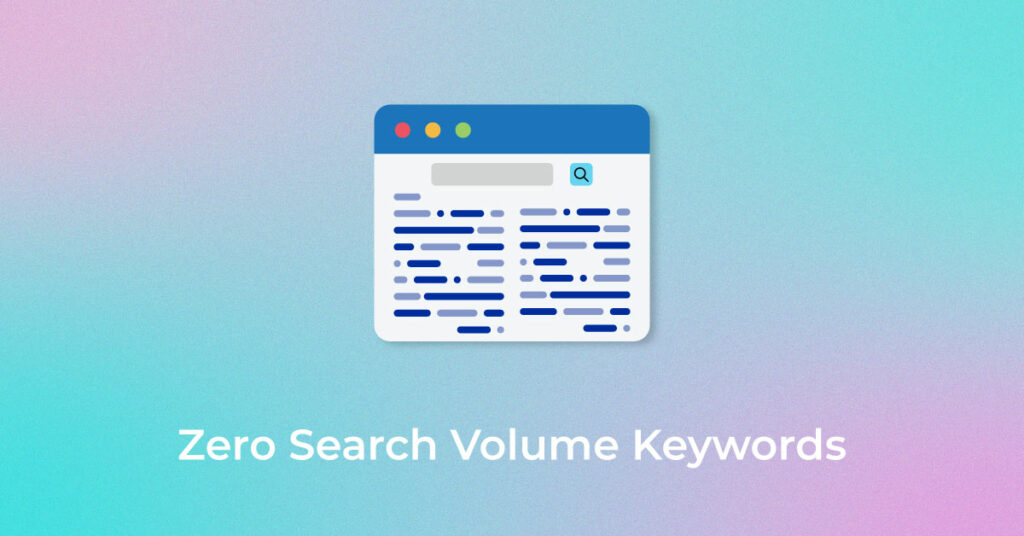
Witness an Increase in your ROI
Unlock higher rankings, quality traffic, and amplified conversions through tailored award-winning SEO strategies.
Hello there! I’m sure you found your way to this article after reading a Tweet or a LinkedIn post that mentioned writing content on zero search volume keywords. Now you must be wondering why would someone create content based on keywords that have no search volume? Well, let me tell you, I was one of you! I never really understood how one could write content using zero search volume keywords that would potentially bring in traffic. Before we start off, let me make one thing clear, it’s the keyword research tools that say the keyword has zero search volume, which is not actually the case. In addition, writing content on zero volume keywords or phrases could be more of a hit or a miss, depending on the keyword. I would like to thank Mark Williams Cook for his webinar on Effective Keyword Research Without Search Volume. And a shoutout to Semji for making it happen!
Let’s kick it off!
What are Zero Search Volume Keywords?
Zero search volume keywords are queries that do not have any search volume or none of the tools showcase any search volumes for those keywords. This is one of the reasons one should not only create content with high search volume but also tap keywords with little or no search volume.
Understanding the Role of Keyword Search Volumes
Before understanding the role of search volumes lets quickly understand what is search volume. The term “search volume” refers to a measure which shows the number of people searching for a specific term or query. When developing the content plan, taking the search volume into consideration is essential since it indicates the popularity of that search query. In an ideal scenario, one will look out for keywords that have a high search volume and a lower amount of competition. But, finding long tail keywords that are appealing to your audience but have low competition is also an effective method. One might also come across keywords with zero search volume that are mainly user generated or long tail.
Most tools provide the average search volume based on the previous twelve months. We all can agree that search volumes are one of the most important factors while conducting keyword research. Apart from that they also help prioritise content topics, understand search trends and create projections based on the same.
Another important factor that stands out while conducting keyword research is “The Search Demand Curve.” Below is a graphical representation of The Search Demand Curve. The Y-axis represents the monthly search volumes. It begins at zero and can go upto millions of searches towards the top. The X-axis represents the different keyphrases a user might search for. The graph clearly represents that phrases with minimal volume account for the majority of the search volumes.

As per the above graphical representation, below are the search volumes for the mentioned keywords:
- income tax slabs – 1,35,000
- income tax slab rates – 5,400
- income tax slab for employees – 90
The keywords that fall under the head and torso segments are harder to rank for as the competition for these terms is also pretty high. If you have been in the SEO game for some time and have managed to rank on top for some highly competitive keywords, you might be aware that it’s not easy staying on top.
Do NOT AVOID writing content on zero search volume keywords!
With over one billion active monthly users, Google is the most visited website on the Internet. With such a high number of users and searches happening on Google, imagine the number of new searches happening every day! It is indeed possible that the tools may miss out on new terms that people are looking for.
Choosing not to write about questions or search queries because they have “zero” or very low search volume is a big mistake. For various reasons, keyword research tools and databases do not report the exact search volume for a number of reasons.
Below is an example for the queries “income tax slab” and “income tax slabs”
As per the data showcased by Google Search Console, there is a huge difference in the searches happening for the two queries. Similarly, Ahrefs also showcases the differences in the search volume for the two terms. However, Google Keyword Planner decides to club these two keywords into the same bucket and shows the same search volume. So is the case with SEMRush.
-
Google Search Console

-
Ahrefs

-
Google Keyword Planner

-
SEMRush

This is just an example for a known keyword, imagine for the keywords that are yet to be discovered by the tools!
BERT: Understanding searches better – October 2019
Bidirectional Encoder Representations from Transformers, or BERT as we call it, is a technology that uses artificial intelligence (AI) such that anyone can create their own state-of-the-art system and ‘train’ it to answer questions. This model takes a novel approach. Instead of processing the words in a sentence individually, it places it in context by looking at the words that come before and after. This helps to understand the intent behind search queries, which leads to more accurate results.
Passage Indexing: A new spelling algorithm – October 2019
Passage indexing was yet another upgrade that provided Google with the ability to better understand the contents of a Web page. It helped them provide a better user experience by populating search engine result pages (SERPs) with the most relevant results. By understanding the passages, and the importance of the entire page, Google claimed to be able to find “needle-in-a-haystack information” that one was looking for.
MUM: Google’s new technology for complex search queries – May 2021
Multitask Unified Model (MUM) has the potential to transform how Google processes complex, long-tail queries. MUM uses the T5 text-to-text framework and is 1,000 times more powerful than BERT.
Google envisions a future in which MUM will provide answers to more complex questions. One of the examples stated by Google is: ”I have travelled across Asia last year. I now want to travel across Europe. Is there anything I need to do to prepare?”
MUM would understand that the user would find information on climate useful and could “prepare” by carrying different kinds of clothing. Maybe even information on precautions that people who are sensitive to even minor changes in climate can take.
These are probably just hints from Google on how this is the best time to target long-tail queries with little or no volume and how Google plans on answering specific user queries.
Tools and Tactics for Finding Zero Search Volume “ZSV” Keywords
Below are some hacks you can use for finding queries of keywords with zero search volume that can help you create the necessary content for your website.
-
Make use of Google Search Console
Make use of the Regular Expressions (Regex) filter to find long-tail queries that are relevant to the content on your website. Based on the selection of the keyword, you can take a call if you plan on creating an individual page for the same or if you plan on optimizing your current content for the same.
You can try this by entering: ([^” “]*\s){10,}?. Similarly, you can change the numerical value to increase or decrease the number of words.
Below is a glimpse on the queries with 10 or more words. Such keywords may or may not have search volumes but will be difficult for you to find while conducting keyword research.

-
Identify niche topics with AnswerThePublic.com
AnswerThePublic will help you to mine, curate and organise data more effectively and efficiently for your targeted keywords. All you have to do is enter one or two keywords related to your niche.
AnswerThePublic produces a graphic that answers the questions related to the keyword, such as who, where, how, and so on. Some of them won’t make sense and that is where human intervention would be required. The tool will do the same for questions, prepositions and comparisons.

It will also help us with queries in alphabetical order. This data can be exported, making it easier to work with.

-
Explore intent with niche topic with AlsoAsked.com
AlsoAsked uses data from the People Also Ask (PAA) section on the Google SERP. The PAA section appears for 50% of the search results.
All you have to do is enter the keyword and a list of questions shows up in the PAA section. The best part is, it also showcases an extended set of questions. This is an unlimited way to explore Google’s data.

It not only shows you a deeper level of data but also shows you the connection between the topics and intent. This will allow you to produce content that has the highest probability of satisfying the intent of the user.
-
Go super deep with Forum and Q&A sites
Another very interesting way to find queries is by exploring Quora and Reddit. Make use of search operators to find questions relevant to your niche.
For example, if you plan on writing content on “investment” you first need to find the subreddit that talks about investment. You can make use of site:reddit.com investment to find the subreddit.

Once you find the subreddit, you can further use the site operator to find queries by using the following search query site:reddit.com/r/IndiaInvestments “how to”. You can change the words in the quotation marks and use words like “can I’, “what it” to explore different options and get the questions people are asking.

I hope you find this content really useful and that you’ll be able to use this, along with your existing techniques, to drive organic traffic to your website via Google in the near future. I would once again love to give a huge shout out to Mark Cook for the wonderful session that inspired me to write this article.
If you liked the article, feel free to follow me on LinkedIn or Twitter. I keep sharing my experiences and insights there.
Popular Searches
Private Blog Networks |Most Subscribed Youtube Channels |Permalink|Backlink Audit | People Also Ask |What Are Backlinks | Hreflang | Submit Url To Google | Local Seo Ranking Factors |Introduction To Schema Markup |Best Blogging Platforms |Reciprocal Links |Artificial Intelligence In Digital Marketing | Subdomain Vs Subfolder | Content Syndication |Google Disavow Links |What Are Google Alerts |Lsi Keywords |Eat Seo Guide |Website Navigation |Zero Search Volume Keywords |Dwell Time|Heatmap Tools|Google Hummingbird Update|Referral Traffic|What Is Digital Marketing And Its Types |How To Do Seo|Canonical Tags|What Is On Page Seo|Off Page Techniques In Seo| Link Building Companies |Image Optimization Seo |Seo Company In Boston |Dallas Seo Services|Seo Service In Houston
How useful was this post?
0 / 5. 0











1 thought on “Why should you Write Content with ZERO Search Volume?”
This content is indeed useful and enlightening. Thank you so much for sharing.
I now have a new perspective regarding low keywords.